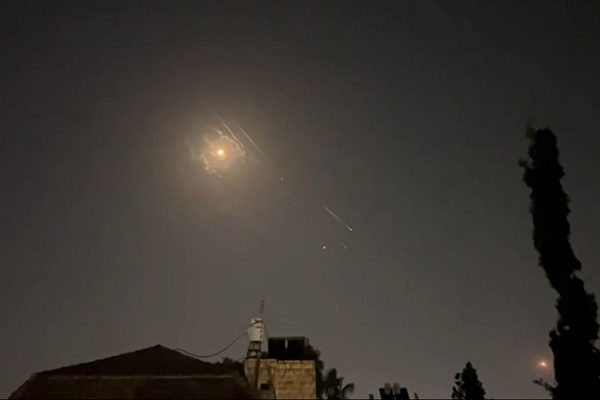Direct translation
News on Israel
Israel says it will retaliate against Iranian attack, what risks it may face
Reporter : Li Xin / Editor : Ye Ziwei / https://www.epochtimes.com/gb/24/4/16/n14227251.htm / Image : The possibility of Israeli retaliation for an Iranian attack could expose Israel to a host of risks. The picture shows that during Iran's attack on Israel on 14 April 2024, the explosion caused by Israel's interception of Iranian weapons lit up the night sky in Jerusalem. (AFPTV / AFP)

After being attacked by hundreds of Iranian missiles and drones last Saturday (13 April 2024), Israel vowed to retaliate. This may expand the "shadow war" that the two countries have been conducting in the Middle East in the form of indirect confrontation into a further direct conflict.
Israeli officials have not said how or when they might launch an attack but as countries around the world urge Israel to exercise restraint, the threat of multi-front warfare is growing, and it is clear that a direct Israeli attack on Iranian territory would have significant consequences.
Iran said it launched the attack in retaliation for an Israeli airstrike in Syria on 1 April 2024 that killed two Iranian generals. Iran has also claimed that it will respond more forcefully if Israel launches any counterattack on its territory.
The United States has urged Israel to exercise restraint and told Israeli leaders that the United States will not participate in any offensive operations against Iran to avoid escalating the war.
Israel's war cabinet has spent the past two days discussing next steps. Here are some key factors they need to consider when making their decision:
Israel is increasingly isolated
Israel's successful aerial defense on Saturday night, along with the United States, Britain, France and Jordan, won Israel a brief moment of international support and sympathy after it had been grappling with civilian casualties in the Gaza war for several days. Yue is increasingly isolated from the international community.
With the help of a coalition of international partners, Israel effectively defended itself last weekend, intercepting 99% of Iranian missiles and drones, with only minor damage and the injury of a 7-year-old girl.
U.S. Central Command leads the coalition in the air defense operation, working closely with Israel and moderate Arab states to form a united front against Iran.
Middle Eastern powerhouse Saudi Arabia, which has no formal diplomatic ties with Israel, also appeared to be helping. Maps released by Israel show that many Iranian missiles flying through Saudi airspace were intercepted.
Israel also uses the airspace of other neighboring Arab countries when intercepting missiles and drones, which means that it obtains permission from these neighboring countries in advance.
But this tacit support from Arab countries does not mean that they will assist Israel in countering Iran. Yoel Guzansky, a senior fellow at the Institute for National Security Studies, an Israeli think tank, said that if Israel insists on going its own way, it will risk this goodwill.
"If Israel doesn't launch a massive retaliatory attack, it can use this now to win itself a lot of praise. But if it does attack, it will lose a lot of praise," he said.
Worry about multi-front operations
A large-scale retaliatory strike on Iran's homeland could trigger a full-scale regional war, so any response must be carefully considered.
A direct strike on Iranian territory would almost certainly result in a brutal counterattack and could prompt further attacks by Lebanese Hezbollah. The Iran-backed group has a far more powerful arsenal than Hamas but has so far shown hesitancy to launch an all-out war.
A direct conflict with Iran would also further drain Israel's military strength, divert its attention from Gaza, and hamper Israel's already war-torn economy.
Military capabilities
The Israeli army is much stronger than other armies in the region. It has an array of high-tech weapons, including F35 fighter jets that can fire long-range munitions. Experts say the predominantly Jewish country has the ability to directly strike Iran or its proxies in the region.
Fabian Hinz, a weapons expert and researcher at the International Institute for Strategic Studies (IISS), a British think tank, said that the Iranian Air Force "is simply incomparable."
However, Hintz also added that many of Iran's missile bases and nuclear facilities are built deep underground, making them difficult to hit. Israel may also need permission from Gulf Arab states to use their airspace - something that is not guaranteed.
(This article is based on a report by the Associated Press)




No comments:
Post a Comment